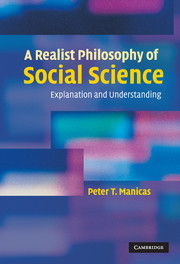Crossref Citations
This Book has been
cited by the following publications. This list is generated based on data provided by Crossref.
Manicas, Peter T.
2007.
Being Sociological.
p.
107.
KAIDESOJA, TUUKKA
2007.
Exploring the Concept of Causal Power in a Critical Realist Tradition.
Journal for the Theory of Social Behaviour,
Vol. 37,
Issue. 1,
p.
63.
ELDER‐VASS, DAVE
2007.
Social Structure and Social Relations.
Journal for the Theory of Social Behaviour,
Vol. 37,
Issue. 4,
p.
463.
Mabee, Bryan
2007.
Levels and Agents, States and People: Micro-Historical Sociological Analysis and International Relations.
International Politics,
Vol. 44,
Issue. 4,
p.
431.
Manicas, Peter
2007.
The Blackwell Companion to Globalization.
p.
461.
FARNELL, BRENDA
and
VARELA, CHARLES R.
2008.
The Second Somatic Revolution1.
Journal for the Theory of Social Behaviour,
Vol. 38,
Issue. 3,
p.
215.
Kenworthy, Lane
and
Hicks, Alexander
2008.
Method and Substance in Macrocomparative Analysis.
p.
1.
Bassett, Keith
2008.
Thinking the Event: Badiou's Philosophy of the Event and the Example of the Paris Commune.
Environment and Planning D: Society and Space,
Vol. 26,
Issue. 5,
p.
895.
Schmid, Michael
2008.
Soziologie, eine multiparadigmatische Wissenschaft.
p.
227.
SANNINO, ANNALISA
2008.
Experiencing Conversations: Bridging the Gap between Discourse and Activity.
Journal for the Theory of Social Behaviour,
Vol. 38,
Issue. 3,
p.
267.
Reed, Isaac
2008.
Maximal Interpretation in Clifford Geertz and the Strong Program in Cultural Sociology: Towards a New Epistemology.
Cultural Sociology,
Vol. 2,
Issue. 2,
p.
187.
Reed, Isaac
2008.
Justifying Sociological Knowledge: From Realism to Interpretation.
Sociological Theory,
Vol. 26,
Issue. 2,
p.
101.
KAIDESOJA, TUUKKA
2009.
Bhaskar and Bunge on Social Emergence.
Journal for the Theory of Social Behaviour,
Vol. 39,
Issue. 3,
p.
300.
Woolcock, Michael
2009.
The next 10 years in development studies: From modernization to multiple modernities, in theory and practice.
The European Journal of Development Research,
Vol. 21,
Issue. 1,
p.
4.
Lyons, John S.
2009.
Communimetrics.
p.
1.
2009.
Philosophy of the Social Sciences.
p.
215.
Mantzavinos, C.
2009.
Philosophy of the Social Sciences.
p.
299.
MARTINS, NUNO
2009.
Rules, Social Ontology and Collective Identity.
Journal for the Theory of Social Behaviour,
Vol. 39,
Issue. 3,
p.
323.
PRATTEN, STEPHEN
2009.
Critical Realism and Causality: Tracing the Aristotelian Legacy.
Journal for the Theory of Social Behaviour,
Vol. 39,
Issue. 2,
p.
189.
Matthews, Roger
2009.
Beyond ‘so what?’ criminology.
Theoretical Criminology,
Vol. 13,
Issue. 3,
p.
341.





